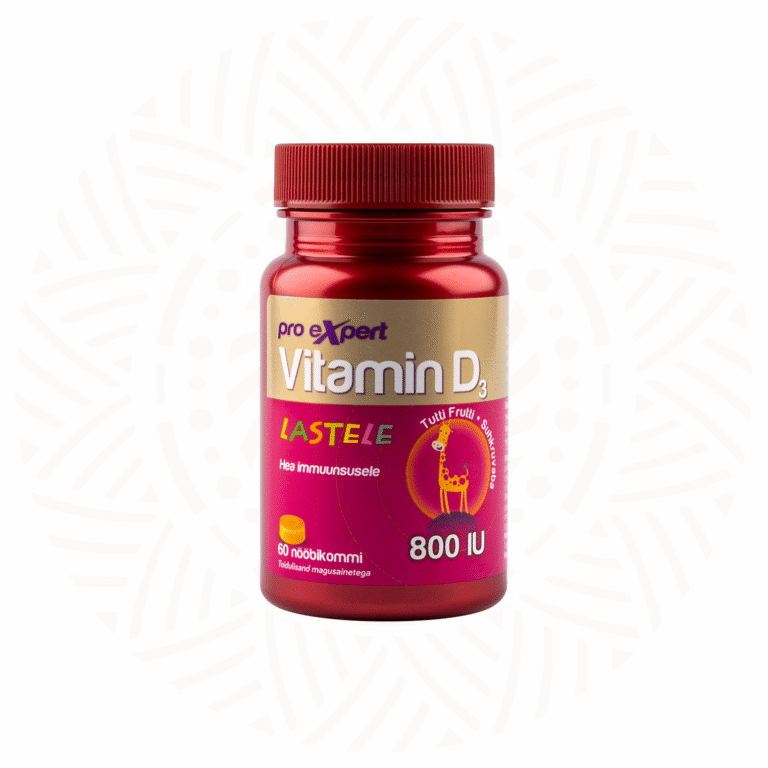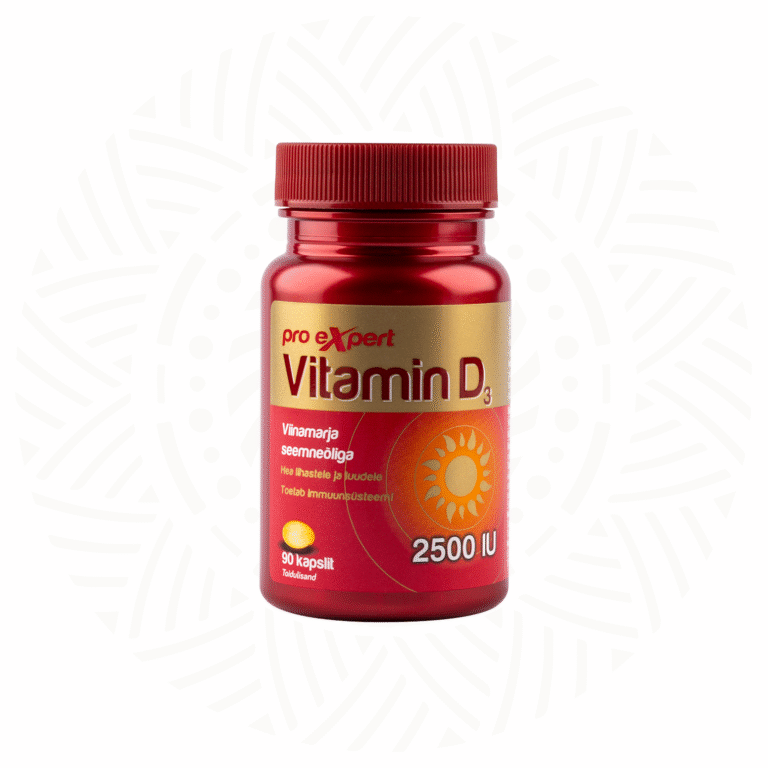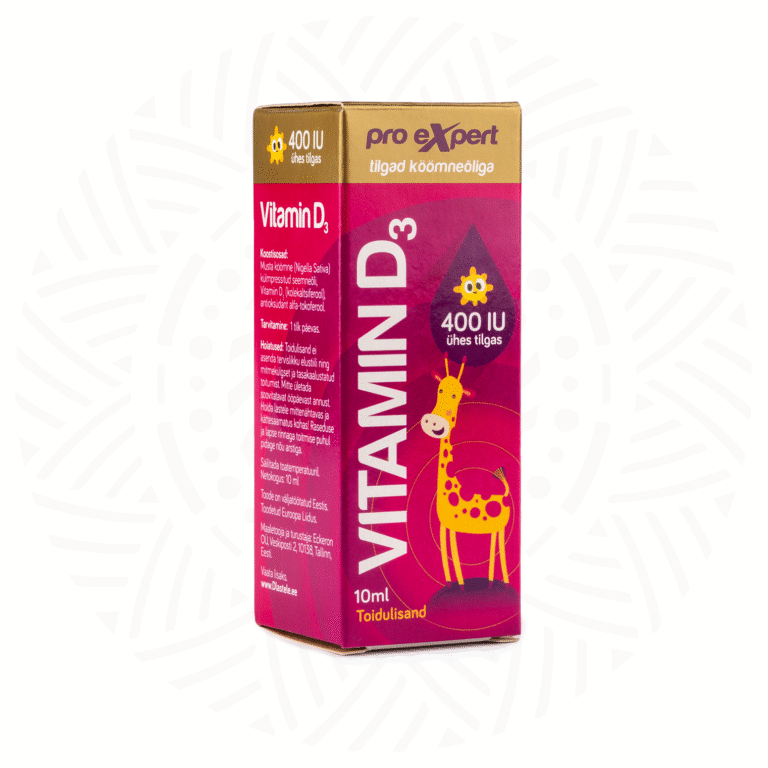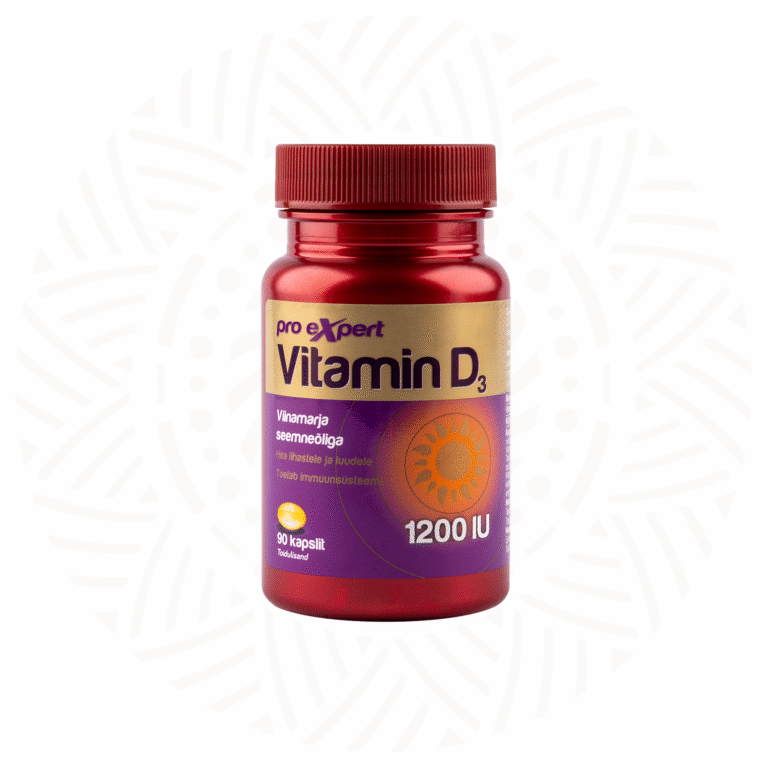Rickets, soft bones, and a weak immune system. These are just a few of the health risks that threaten your baby if you do not give them vitamin D. Below, you will learn how much and which vitamin D your baby needs every day and how its deficiency affects their development?
What is Vitamin D?
Vitamin D or cholecalciferol is a fat-soluble vitamin with a wide range of effects. It is often called the sunshine vitamin because vitamin D is produced in the body through the skin’s exposure to sunlight or ultraviolet radiation (UVB).
Since vitamin D is fat-soluble, water-based vitamin D has lower bioavailability than oil-based forms. This means that water-based vitamin D for babies is absorbed less efficiently and may lead to a deficiency in vitamin D for your baby.
Why is Vitamin D important for babies?
Vitamin D for babies is essential for normal bone and tooth development and strengthening the immune system. Vitamin D also plays a crucial role in your baby’s mental and physical development. In the case of vitamin D deficiency, the baby gets tired much more quickly, which can lead to developmental delays.
Is the sun enough as a source of vitamin D for babies?
UVB radiation is very dangerous for your baby. A baby’s skin contains little melanin in the first year of life, which provides protection against sun radiation. Therefore, a baby’s skin can quickly get sunburned under direct sunlight. It is important to note that each sunburn increases the risk of developing skin cancer later in life.
To protect your baby’s skin from harmful sun radiation, dermatologists recommend using sunscreens with at least SPF 50. It is worth knowing that even SPF 8 reduces vitamin D synthesis by 92.5%.
By using sunscreen, you protect your baby’s skin from both sunburn and an increase in vitamin D levels, as sunscreens block vitamin D synthesis in the skin. Therefore, vitamin D deficiency in babies is very easy to occur.
Is breast milk enough as a source of vitamin D for babies?
Breast milk is the best food for babies, and no one doubts that! It contains everything necessary for the baby, except for enough vitamin D. Since mothers often have low vitamin D reserves in their bodies, breast milk is not an adequate source of vitamin D for the baby.
Recent studies have shown that if a mother takes 4000 IU of vitamin D daily during breastfeeding, it enriches breast milk with vitamin D. However, there can always be situations where the baby still does not get enough vitamin D from breast milk. To prevent complications arising from vitamin D deficiency, pediatricians recommend giving the baby an additional 400 IU of vitamin D daily.
Does formula milk provide enough vitamin D for babies?
Although formula milks are fortified with vitamin D, it is still recommended to give additional vitamin D to infants. The main reason is that to get the daily vitamin D amount, the baby would need to drink 1000 ml of formula milk per day. Be sure to check the information on the formula milk packaging.
It is also important to note that the absorption of vitamin D from formula milk is not always as effective as from vitamin D drops. Therefore, it is crucial that the baby gets 400 IU of vitamin D daily in the form of drops.
How much vitamin D does a baby need?
Did you know that your baby needs 7 times more vitamin D compared to an adult? The baby’s development and growth are especially fast in the first year of life – growing up to 25 cm per year.
To ensure normal development of the baby’s bones, teeth, muscles, internal organs, and nervous system, the baby’s vitamin D amount in the first year of life should be at least 400 IU per day and a maximum of up to 1000 IU of vitamin D, regardless of diet.
When can an overdose occur?
Signs of vitamin D overdose may occur primarily when large doses are given over a long period of time. Taking large amounts of vitamin D for a short period does not cause health problems for the baby. Overdose can cause nausea, vomiting, stomach pain, muscle weakness, joint tenderness, and drowsiness.
The safe upper limits for vitamin D intake according to the European Food Safety Authority are:
- for infants under 1 year old up to 1000 IU per day
- for children aged 1-10 years up to 2000 IU per day
What happens if you don’t give your baby vitamin D?
If you do not give your baby enough vitamin D, it can lead to vitamin D deficiency, which in turn causes several serious health problems. Here are some potential consequences if the baby develops a vitamin D deficiency:
- Rickets: Vitamin D deficiency significantly increases the risk of rickets, especially in babies. Rickets is a condition where bones become soft, brittle, and deformed.
- Fragile bones: Vitamin D helps calcium absorb, making bones strong. Without sufficient vitamin D, bones become brittle, and the risk of fractures increases. It has been proven that without vitamin D, only 10-15% of calcium is absorbed in the intestines. With sufficient vitamin D, 30-40%, or double the amount of calcium, is absorbed.
- More frequent colds: Vitamin D plays an important role in the effective functioning of the baby’s immune system. In case of vitamin D deficiency, the baby’s resistance to infections decreases, and the body cannot fight diseases quickly, making it easier for the baby to get sick. The illness also lasts longer, increasing the risk of complications.
- Later health problems: Vitamin D deficiency can be associated with later health problems, including cardiovascular diseases, diabetes, autoimmune diseases, and an increased risk of cancer in later life.
Vitamin D deficiency causes bone formation disorders
Vitamin D deficiency in babies can lead to rickets. Rickets softens bones and causes deformities in the skull, chest, ribs, spine, and legs. As a result, legs can take the shape of O or X. This is accompanied by bone pain, which can be very severe. If the baby does not support their legs well, is lethargic, and does not start walking on time, they may have rickets.
In the case of vitamin D deficiency, tooth development can be disturbed, growth slows down, and fractures may occur.
Vitamin D deficiency causes more frequent illnesses
Did you know that your baby’s immune system develops during the first three years of life? During this period, vitamin D plays a very important role because it strengthens your baby’s immune system. A baby with low vitamin D levels gets sick much more frequently from viral diseases, and recovery takes longer.
Vitamin D and gas pains
From the second week of life until the fourth month, almost every other baby suffers from gas pains. Gas pains are one of the most common problems in babies, and their exact causes are unknown. It is believed that gas pains or colic may be caused by the immaturity of the digestive tract, psychological issues, milk protein allergy, or vitamin D – specifically the oil in which it is dissolved.
Usually, gas pains affect the baby in the late afternoon and during night sleep. Gas pains cause the baby discomfort and trigger several hours of crying fits, which seem like an endless vicious cycle. When crying, the baby swallows excess air, leading to more air bubbles in the intestines.
The best treatment for relieving gas pains is time. The older the baby gets, the less frequent they become. Also, find the right vitamin D for your baby.
Which Vitamin D is best for babies?
The selection of products on pharmacy shelves is large, and choosing the right one can be challenging. The best vitamin D for babies is in oil drops, which are easy and convenient to use. Olive, coconut, sunflower, and other oils are often used, which may cause allergies and gas issues for babies.
To prevent gas pains, it is recommended to prefer cold-pressed black seed oil. Vitamin D with black seed oil is gentle on the baby’s tummy and effective for gas pains. Cold-pressed black seed oil is also suitable for allergic babies as it does not contain allergens.
The difference also lies in the dosage of the drops. 4000 IU may be contained in one or five drops. If you prefer convenience, choose a product that requires only 1 drop per day.
Vitamin D is a fat-soluble vitamin. Therefore, water-based vitamin D is not the wisest choice. This is the main reason why water-based vitamin D for babies is not available on pharmacy shelves in Estonia.
When and how to give vitamin D to a baby?
For newborns, vitamin D supplementation is not always necessary during the first two weeks since most babies have sufficient vitamin D reserves from the mother at birth. Therefore, vitamin D is often given to newborns after two weeks.
From the second week of life, pediatricians recommend giving the baby 400 IU of vitamin D daily. Vitamin D is a fat-soluble vitamin and is best absorbed when given to the baby during meals. Vitamin D for infants is in the form of drops, not capsules.
We wish you good health, dear babies!








